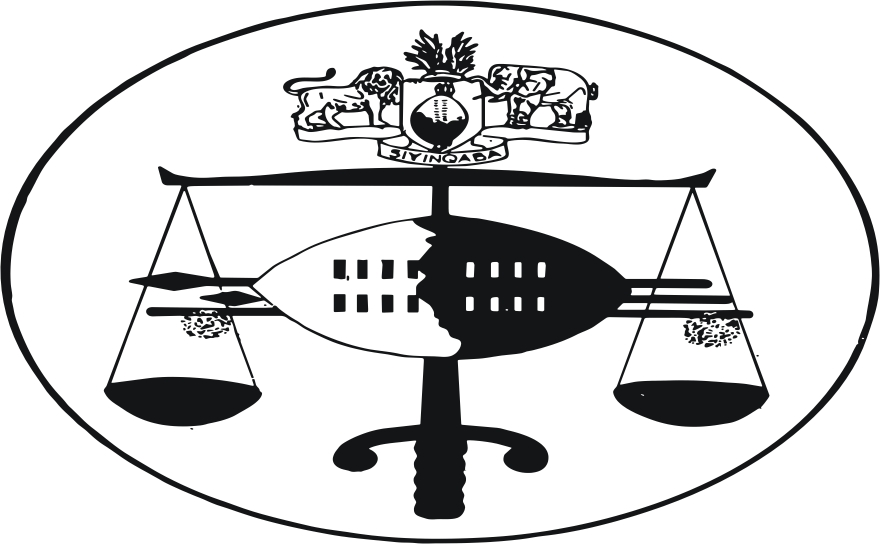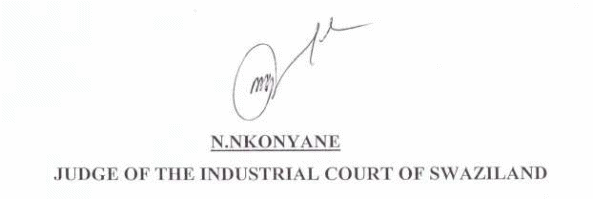
IN THE INDUSTRIAL COURT OF SWAZILAND
HELD AT MBABANE CASE NO. 156/15
In the matter between:
MBONGENI GWEBU Applicant
and
SWAZI MOTOR SPARES (PTY)
LIMITED t/a AUTO ZONE (MBABANE) Respondent
Neutral citation: Mbongeni Gwebu v Swazi Motor Spares (PTY) Ltd (156/15) [2016] SZIC 61 (December 07, 2016)
Coram: N. Nkonyane, J
(Sitting with G. Ndzinisa and S. Mvubu
Nominated Members of the Court)
Heard submissions: 29/11/16
Delivered ruling: 07/12/16
Labour Law---Application for referral of dispute to arbitration under the auspices of CMAC---Factors to be taken into account include, inter alia: the amount of the claim involved, complexity of the factual and legal questions involved, backlog of cases.
Held---The factual and legal questions involved are not so complex as to require that the matter to be heard by the Court. Dispute accordingly referred to arbitration under the auspices of CMAC.
_____________________________________________________________
RULING ON APPLICATION FOR REFERRAL TO ARBITRATION 07.12.16
1. The Applicant is a former employee of the Respondent. He was employed by the Respondent in April 2011. He stopped working for the Respondent after his resignation by letter dated 04th July, 2013 wherein he stated that the conduct of the employer towards him was such that he could no longer continue to render his services to the employer.
2. The Applicant reported the matter to Conciliation Mediation & Arbitration Commission (CMAC) as a dispute. The dispute could not be resolved at CMAC and a certificate of unresolved dispute was duly issued by the Commission.
3. The Applicant thereafter filed an application for the determination of the unresolved dispute before the Court. The Respondent filed its Reply in opposition thereto. The matter was thereafter referred to the Registrar’s Office for the allocation of trial dates. The matter is currently with the Registrar’s Office pending allocation of trial dates.
4. The Applicant has now invoked the provisions of Rule 18 of this Court’s Rules. Rule 18 provides, inter alia, that a party may apply to the President for a direction that a pending application be referred to arbitration under the auspices of the Commission.
5. The Applicant’s application for the referral of the dispute to arbitration is opposed by the Respondent. On behalf of the Applicant it was argued that;
5.1 The total amount claimed by the Applicant is not substantial as it amounts to E43, 845.60.
5.2 The issues for determination are not so complex as to require that the matter be heard in the more formal and legalistic environment of the Court.
5.3 Arbitration is cheap expeditions and cost effective. The Applicant having been dismissed in July 2013 is still not formerly employed but survives by getting piece jobs, he will not therefore be able to afford the legal fees.
6. On behalf of the Respondent it was argued to the contrary that;
6.1 The issue involved is complex, it being a question of constructive dismissal.
6.2 The amount of claim involved is substantial for a business enterprise such as the Respondent.
7. In terms of Section 8 (8) of the Industrial Relations Act No.1 of 2000 as amended, it is provided that;
“Notwithstanding the provisions of Section 85 (2), the President of the Court may direct that any dispute referred to it in terms of this or any other Act be determined by arbitration under the auspices of the Commission”
This use of the word “may” means that the President is called upon to exercise his discretion. The discretion must be judiciously exercised after having taken into account all the circumstances of the case.
8. In the present case, the Applicant grounded his application on constructive dismissal. He alleged that the conduct of his employer was such that he could no longer be expected to continue to be in the employment of the Respondent. The Court has had the opportunity to read the pleadings filed of record. Although the Applicant’s application is based on constructive dismissal, the factual matrix, at least from the perusal of the pleadings, are not so complex as to require the formal and legalistic processes of the Court.
9. Further, the arbitration process under the auspices of CMAC is undertaken either by legally trained people, legal practitioners or people who are experienced in industrial relations. Any fear that the dispute may not be properly handled is therefore more apparent than real.
10. The Applicant has not been able to be gainfully employed on a full time basis. His attorney submitted that he survives by doing piece jobs. The Applicant will therefore be financially prejudiced if the matter were to be heard in Court whose processes usually attract huge legal fees. The legislature has provided a swift and cheap alternative, that is, arbitration. There is no reason why the litigants should not be allowed to try this cheap alternative route created by the law.
11. The Respondent on the other hand is also entitled to have the matter heard in Court. The Court must therefore carefully balance the competing interestsb of the parties.
12. In casu, taking into account the amount of the total claims involved, the backlog of cases in this Court, the factual issues involved, the interests of justice and fairness, I come to conclusion that the Respondent will not suffer any prejudice if the dispute were to be referred to arbitration.
13. In the circumstances, I direct that the dispute be determined by arbitration under the auspices of the Commission.

6